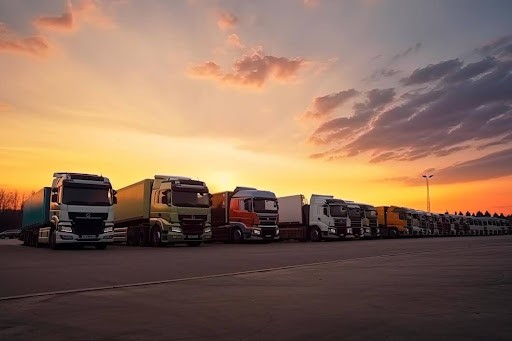 Engaging in the operation of a trucking enterprise can offer fulfilling outcomes albeit accompanied by inherent risks. Successfully managing a trucking business hinges significantly on comprehending liability aspects and enacting measures to safeguard both your assets and reputation. A meticulously outlined business plan for trucking company not only acts as a roadmap for the company’s trajectory but also plays a critical role in accessing funding alluring potential investors and forging essential partnerships crucial for both stability and growth.
Engaging in the operation of a trucking enterprise can offer fulfilling outcomes albeit accompanied by inherent risks. Successfully managing a trucking business hinges significantly on comprehending liability aspects and enacting measures to safeguard both your assets and reputation. A meticulously outlined business plan for trucking company not only acts as a roadmap for the company’s trajectory but also plays a critical role in accessing funding alluring potential investors and forging essential partnerships crucial for both stability and growth.
Types of Liability
Trucking enterprises navigate a maze of liability categories. These comprise general liability tied to mishaps or injuries involving your vehicles or drivers’ cargo liability shielding against goods loss or harm during transit and environmental liability stemming from spills or pollution. Grasping these distinct liability dimensions is key to adeptly managing risks and fortifying your business against unforeseen turbulence.
Insurance Coverage
Protecting your trucking business from potential liabilities is akin to cocooning it in a safe net through robust insurance coverage. This encompasses securing commercial auto insurance for truck incidents, cargo insurance for goods protection and pollution insurance for environmental risks. Teaming up with a well-versed insurance agency not focusing on the trucking sector will help tailor coverage options to your specific needs.
For instance, consider a scenario where a trucking company experienced a significant financial setback due to an accident involving one of its trucks. The accident not only caused considerable damage to the vehicle but also resulted in injury to another party and the loss of the cargo being transported. Without comprehensive commercial auto insurance and cargo insurance, the company faced out-of-pocket expenses for vehicle repairs, legal fees for injury claims, and the cost of the lost cargo. This example underscores the critical importance of having suitable insurance coverage to safeguard against unforeseen financial burdens and ensure business continuity.
Risk Management Strategies
Apart from insurance coverage, integrating efficient risk management strategies can substantially decrease the probability of encountering expensive liabilities. These approaches may include thorough driver training programs, regular vehicle maintenance checks and strict adherence to safety regulations and protocols. By investing in proactive risk management practices, accidents or incidents that could result in financial losses or damage to your reputation can be greatly minimized.
Legal Compliance
Managing liability in the trucking biz is akin to a salsa with legal rules: you’ve gotta groove to state and federal tunes. Think beyond regulations; it’s more like balancing on a circus ball. Adhering to clock hours meticulous recordkeeping and rolling wheels in sync with DOT safety norms. Neglecting these? It’s not just walking a tightrope; it’s priming the pump for pricey pickle jars.
Reputation Management
When it comes to safeguarding your assets and reputation in the trucking industry a strong emphasis on customer service and communication is essential. Establishing trust with your clients by offering dependable service, transparent pricing and timely updates on deliveries can lay the foundation for a positive reputation that distinguishes you from your rivals. In cases of incidents or claims demonstrating responsiveness, empathy and a proactive stance in resolving issues can significantly contribute to upholding your company image and credibility.
Industry Competition and Challenges
Competition and hurdles in the trucking industry carry substantial weight molding the operational landscape for businesses. The field of trucking is a tough one buzzing with various participants spanning from big established corporations to smaller independent operators. This rivalry can get intense particularly in the realms of securing contracts keeping operational expenses down and luring competent drivers. Furthermore the sector grapples with persistent obstacles like fluctuating fuel costs, shifts in regulations and the necessity for technological integration. Addressing these hurdles demands thoughtful strategizing investments in cutting-edge technologies like fleet management software and a dedication to sustainability and productivity. Staying informed about industry trends and compliance needs is vital for excelling in this lively and demanding domain.
Take for example the captivating saga of Mountain Movers, a midsized trucking company rooted in Colorado. Engulfed by fierce competition and soaring fuel expenses they took a leap of faith with a cutting edge fleet management software. This technological masterpiece provided real time insights into vehicle locations’ fuel efficiency and driver performance. Leveraging this advanced solution they streamlined their routes curbing fuel usage and enhancing delivery speed. Consequently, their competitive stance and profitability received a substantial boost. Furthermore, Mountain Movers rolled out an intensive driver training program that honed in on safety and efficiency. This strategic move led to a significant drop in accident rates and a marked reduction in insurance costs. Not only did these tactics set them apart in a crowded market but they also effectively mitigated their liability risks.
In the world of trucking, picturing liability is akin to uncovering hidden treasures that are vital for shielding both your assets and reputation as a business owner. Think of potential risks as your map insurance coverage as your shield risk management strategies as your trusty companion and regulatory compliance as your guiding star in uncharted territories. By prioritizing customer service you assemble a crew that ensures safe passage through turbulent waters. Beyond financial gains the true wealth lies in fostering trust with all stakeholders involved in crafting your company’s narrative. Safety compliance communication and integrity act as the cornerstone for sustainable growth and resilience amidst the ever-evolving dynamics of trucking enterprises.










